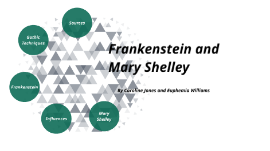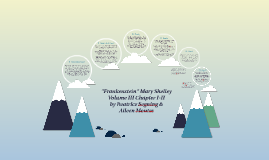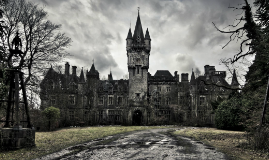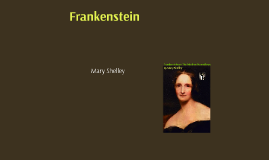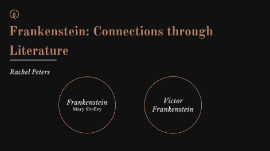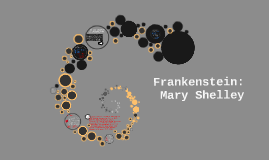Frankenstein/Mary Shelley
Transcript: Frankenstein and Mary Shelley By Caroline Jones and Euphemia Williams Mary Shelley Mary Shelley Mary Shelley was born to Mary Wollstonecraft and William Godwin. Her mother died 10 days later, due to a complicated birth. Her father was largely self-absorbed and gave little time to Shelley or her maternal half sister, Fanny Imlay. When she was four her father married Mary Jane Clairmont, who already had two children from a previous marriage. Shelley often retreated to her mother's grave to read, write, and later, to meet with her lover, Percy Shelley. Born August 30, 1797 Childhood Shelley received no formal education but spent much of her time reading her mother's works. Education Education Shelley later published five more novels, the most well know being The Last Man (1826). She wrote a memior Rambles in Germany and Italy in 1840, 1842, and 1843 (1844). PUBLISHED AFTER HER DEATH A short novel called Mathilda. Published in the 1950's. In 1922, two verse drama's were published. Other Works Other Writings They two first met when Shelley was 14 Romance started two years later Percy Shelley was married at the time their romance started Mary Shelley ran away with Shelley one month before she turned 17. The couple married in London in 1816. They had three children who all died shortly after their births. They successfully had one child, Percy Florence, in 1819. Married Percy Shelley in 1816 Marriage Following Percy's death in 1822, Shelley carried her husbands heart. Fun Facts Fun Facts Mary Shelley wrote Frankenstein in 1817. Some of her major influences included her mother, Mary Wollstonecraft, her husband, Percy Bysshe Shelley, her friend, Lord Byron. She was greatly influenced by the rise of the Romantic Era and new advancements in electricity and galvanism. Gothic horror as a genre is loosely defined as starting in the mid 18th century with the 1764 publication of "The Castle of Otranto" by Horace Walpole, but Shelley is still a relatively early Gothic horror writer, so her literary Gothic influences were relatively scarce. Influences Influences Electricity was found and experimented with as early as 600 BC in the form of static electricity. In the early 1600s, Thomas Browne first used the term 'electricity,' and in 1752, Benjamin Franklin performed his famed key-and-kite experiment. In 1800, Alessandro Volta created the first chemical battery. With such advancements in electricity and science on the horizon, another term surfaced, named after its creator, a friend and peer of Volta--Luigi Galvani. He presented the idea of galvanism. Galvani studied animal tissues and experimented with the relationship it had to electricity. In his most famous experiment, he made the amputated legs of a frog twitch when he connected them to an electric charge. He proposed the idea of 'galvanism'--stimulating movement in organic matter through electricity. Shelley acknowledged that it was one of her influences by saying, "Perhaps a corpse would be re-animated; galvanism had given token of such things: perhaps the component parts of a creature might be manufactured, brought together, and endued with vital warmth." Galvanism and Electricity Galvanism and Electricity The Romantic and Gothic eras both started in the mid 18th century, and both were inspired as a counter-movement to the Enlightenment. They both focused on emotions and feelings rather than logic, and used nature and mythology as and descriptions. While Shelley was obviously influenced heavily by advancements in science, the primary themes in her novel, such as loneliness, isolation, revenge, and compassion, were drawn from the concepts brought forth during the Romantic Era. The Romantic Era Romanticism "Satan had his companions, fellow-devils, to admire and encourage him; but I am solitary and abhorred." "We will each write a ghost story..." These words, uttered by Lord Byron in the summer of 1816 as he, Mary Shelley and her husband, and a couple other close friends, sat in a Gothic-style, Genevan house called the Villa of Diodati, would be the inspiration for Frankenstein. One of the most obvious evidences of inspiration, however, is found in Shelley's characterization of Victor Frankenstein. In Lord Byron's poem, "Childe Harold's Pilgrimage," Childe Harold is a Byronic hero, and is considered to be the origin of the concept. A Byronic hero is essentially an anti-hero--tortured, arrogant, mysterious, socially and intellectually advanced, dark, and destructive. Victor Frankenstein fits right into this trope, as a mad, arrogant, mysterious, destructive, and intelligent scientist. Byron and Shelley had very similar writing styles, too, as both were influenced by the Romantic era. Lord Byron Lord Byron A famous but false rumor claims that Frankenstein was not written by Mary Shelley, but rather by her husband, Percy Bysshe Shelley. While this is likely untrue, the two did collaborate and consult each other on their literary pursuits and progress. They wrote the prefaces






